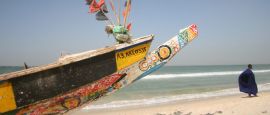Mauritania History, Language and Culture
History of Mauritania
Mauritania lies across one of the great trans-Saharan trade routes. For over 500 years, to 1674 when the Arabs defeated them, the Almoravid Dynasty controlled the trade in gold, slaves and salt.
French domination of the area was established in the late 19th century and until 1960 when Mauritania achieved independence. Since the 1970s, the country has been locked in dispute with its two northern neighbours, Algeria and Morocco, concerning the future of Western Sahara, a disputed territory ceded to Morocco and Mauritania by Spain in 1975.
Mauritania's first post-independence ruler, Mukhtar Ould Daddah, was able to keep control of his poor, sparsely populated desert country only by playing his two powerful neighbours, Morocco and Algeria, off against one another. This didn't wash for long and he was duly deposed in a military coup in 1978.
The dominant political figure in Mauritania for the last two decades has been Maaouiya Ould Sid'Ahmed Taya, a former army officer who first seized power in a military coup in 1984.
In the early 1990s, Mauritania came under pressure to introduce representative civilian government. Elections for a presidency and a bicameral parliament were held the following year. Taya reinvented himself as a civilian politician and comfortably won the presidential race. He was elected for a third term in the hotly disputed presidential poll in November 2003.
What followed was growing discontent over the government's often heavy-handed approach to political opposition, which mainly comes from the organised labour movement and Islamist organisations. Both are subject to periodic crackdowns. There are also tensions between black Mauritanians and those of Arab origin.
In 2005, there was a largely bloodless coup in which a transitional government was appointed. A new constitution was passed in 2006 and elections held in 2007. These proved inconclusive and there was another coup in 2008. Mohamed Ould Abdel Aziz, leader of the 2005 coup, was elected president in 2009.
Did you know?
• Mauritania’s coast is home to the so-called Dolphin Tribe, a fishing community that uses wild dolphins to help them haul in the day’s catch.
• Mauritania boasts one of the longest trains in the world. Stretching up to 3km long (1.8miles), the train carries iron ore from Adrar to the coast.
• In this country plagued by food shortages, to be fat is to be beautiful, wealthy and prestigious. Some girls under go a process of ‘fattening up’ to ensure they can make a good marriage.




 You know where
You know where